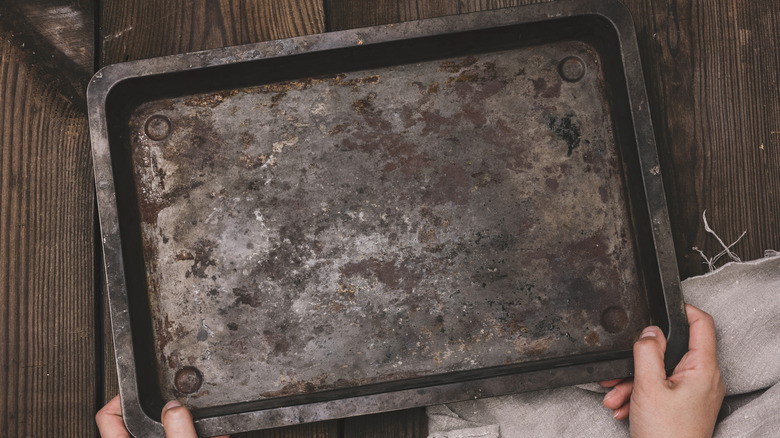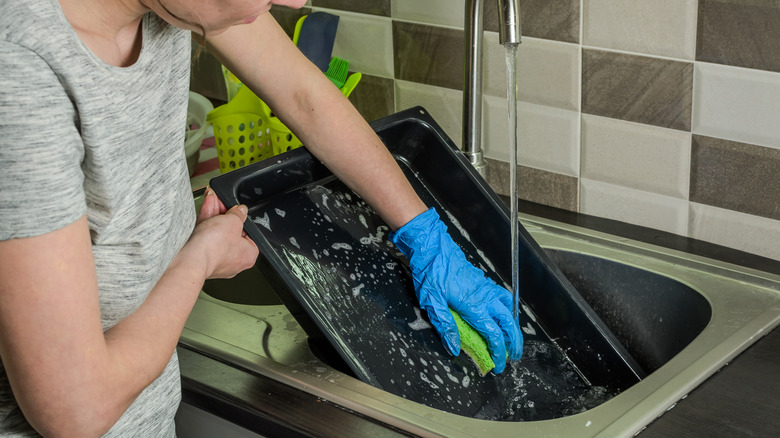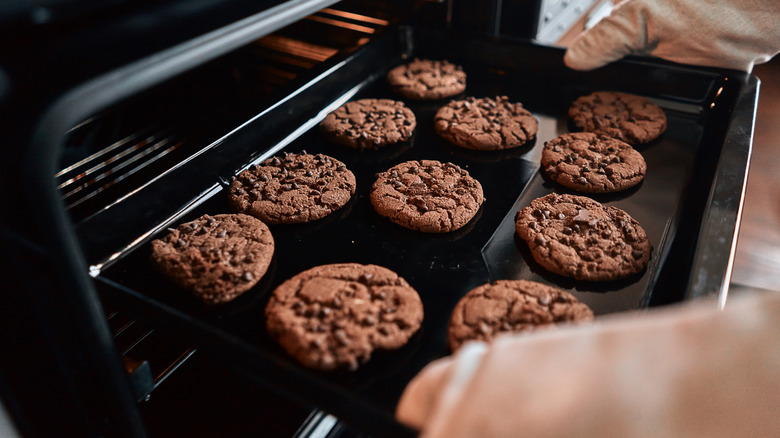Mistakes Everyone Makes When Cleaning Baking Sheets
Baking sheets have seen it all: cookies, roasts, and endless batches of fried food. Getting them clean isn't the most glamorous part of baking. We all make mistakes when it comes to giving them a proper clean, whether it's using the wrong tools or jumping into scrubbing before the pan has cooled down. These simple errors can lead to tarnishing, scratches, or extra effort.
Everyone loves to use a shiny new cleaning sponge or brush, but not all tools are created equal when it comes to baking sheets. Scrubbing with a rough steel wool pad or a brush with stiff bristles can leave scratches or dents. You might also be tempted to use an abrasive cleaner to remove stubborn burnt pan stains, but this can damage the surface, making cleaning even more difficult in the future. The best tools for cleaning baking sheets are non-abrasive sponges or microfiber cloths. These are gentle options that won't leave scratches or cause your baking sheet to lose its smooth finish.
Another mistake is jumping into the cleaning process too soon. Being eager to clean up after you've just baked a giant batch of chocolate chip cookies is understandable, but patience is key. Scrubbing your baking sheet when it's hot can cause the metal to become warped and make it even harder to clean after your next batch of cookies. The best approach is to let the pan cool down a little before tackling it.
How to clean your baking sheets properly
Cleaning your baking sheets doesn't have to be a hassle, but you should follow a few best practices to ensure your pans stay in great shape. If your baking sheet is a little greasy or has no significant buildup, start by hand washing it with hot water and dish soap. This will remove most of the residue and help keep your pan looking fresh. Make sure to get into all the corners of the pan to remove any hidden grease, and don't forget to clean the underside of the sheet as well.
If you're dealing with tougher, stuck-on messes, you can soak your baking sheet in hot water with a splash of dish soap. Let it sit for about 15 to 20 minutes, then gently scrub away the buildup with a dish brush or the scouring side of a sponge. The soak will help loosen up the tough spots, making it easier to eliminate any gunk. After scrubbing the mess, rinse the pan thoroughly with hot water to remove any soap residue.
Remember, it's best to properly hand wash dishes such as baking sheets. While the dishwasher may seem like a quick solution, it can cause your sheet to tarnish or lose its shine. While this won't affect the baking sheet's functionality, it can leave your pan looking a little unhappy.
Tips for maintaining the longevity of your baking sheets
There are some tips you'll want to follow to ensure your baking sheets remain in tip-top shape over the long haul. First, avoid using metal utensils when cooking on your baking sheets. You know that fancy metal spatula you've been using? Put it down. Metal can scrape and scratch the surface, causing damage that makes cleaning harder and food more likely to stick. Instead, opt for silicone, wood, or plastic utensils.
Another way to keep your sheet in prime condition is to avoid high heat settings, especially when using non-stick baking sheets. High heat can cause the coating to deteriorate, leading to a shorter lifespan for your pan. Stick to medium heat for best results, and always follow the manufacturer's guidelines for maximum temperature. This will help keep the coating intact and ensure that your baked goods always come out perfectly. Also, avoid putting your sheet through temperature extremes, like going from a super hot oven directly to a cold countertop.
Finally, proper storage is key to maintaining your baking sheets. Store them in a cool, dry place, and if possible, keep them flat or stacked with something soft, like a towel, between them. Avoid placing heavy items on your baking sheets, which can cause warping or dents.


